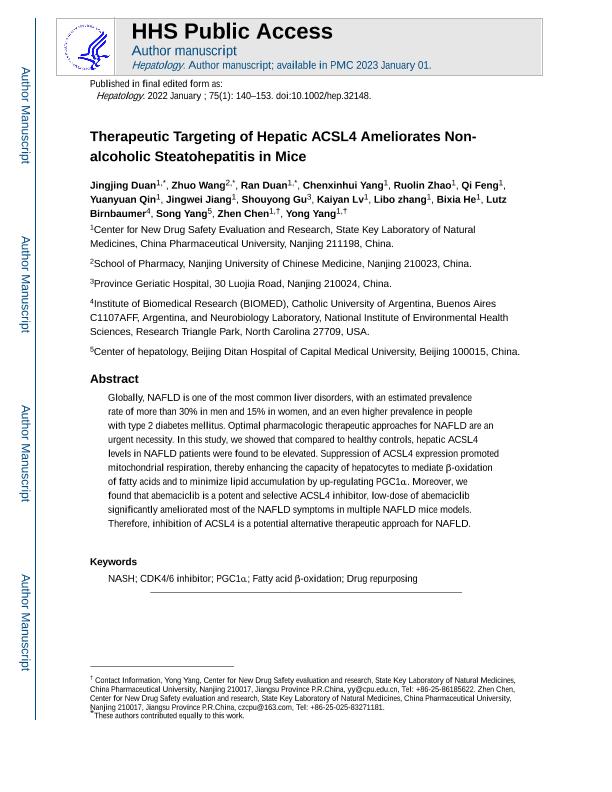Artículo
Therapeutic targeting of hepatic ACSL4 ameliorates NASH in mice
Duan, Jingjing; Wang, Zhuo; Duan, Ran; Yang, Chenxinhui; Zhao, Ruolin; Feng, Qi; Qin, Yuanyuan; Jiang, Jingwei; Gu, Shouyong; Lv, Kaiyan; Zhang, Libo; He, Bixia; Birnbaumer, Lutz ; Yang, Song; Chen, Zhen; Yang, Yong
; Yang, Song; Chen, Zhen; Yang, Yong
 ; Yang, Song; Chen, Zhen; Yang, Yong
; Yang, Song; Chen, Zhen; Yang, Yong
Fecha de publicación:
01/2022
Editorial:
John Wiley & Sons
Revista:
Hepatology (Baltimore, Md.)
ISSN:
0270-9139
Idioma:
Inglés
Tipo de recurso:
Artículo publicado
Clasificación temática:
Resumen
Background and Aims: Globally, NAFLD is one of the most common liver disorders, with an estimated prevalence rate of more than 30% in men and 15% in women and an even higher prevalence in people with type 2 diabetes mellitus. Optimal pharmacologic therapeutic approaches for NAFLD are an urgent necessity. Approach and Results: In this study, we showed that compared with healthy controls, hepatic ACSL4 levels in patients with NAFLD were found to be elevated. Suppression of ACSL4 expression promoted mitochondrial respiration, thereby enhancing the capacity of hepatocytes to mediate β-oxidation of fatty acids and to minimize lipid accumulation by up-regulating peroxisome proliferator-activated receptor coactivator-1 alpha. Moreover, we found that abemaciclib is a potent and selective ACSL4 inhibitor, and low dose of abemaciclib significantly ameliorated most of the NAFLD symptoms in multiple NAFLD mice models. Conclusions: Therefore, inhibition of ACSL4 is a potential alternative therapeutic approach for NAFLD.
Palabras clave:
ACSL4
Archivos asociados
Licencia
Identificadores
Colecciones
Articulos(BIOMED)
Articulos de INSTITUTO DE INVESTIGACIONES BIOMEDICAS
Articulos de INSTITUTO DE INVESTIGACIONES BIOMEDICAS
Citación
Duan, Jingjing; Wang, Zhuo; Duan, Ran; Yang, Chenxinhui; Zhao, Ruolin; et al.; Therapeutic targeting of hepatic ACSL4 ameliorates NASH in mice; John Wiley & Sons; Hepatology (Baltimore, Md.); 75; 1; 1-2022; 140-153
Compartir
Altmétricas



